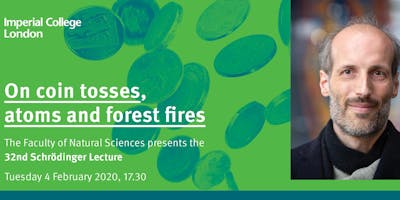You must login before you can post a comment.
- 🍻
The Schrödinger Lecture 2020: On coin tosses, atoms and forest fires
Science & Technology
The lecture is free to attend and open to all, but registration is required in advance
An exhibition and drinks reception will follow the lecture at 18:30 in the Queen's Tower Rooms
Abstract
Fields Medalist Professor Sir Martin Hairer will explore some of the mathematical objects arising naturally in probability theory, as well as some of their surprising properties. In particular, he will show us how one of these objects was involved in the confirmation of the existence of atoms over 100 years ago and how new properties of related objects are still being discovered today.
Biography
Sir Martin Hairer is a professor of pure mathematics and Chair in Probability and Stochastic Analysis at Imperial College London. His main areas of interest are probability theory and analysis, with a particular focus on the analysis of stochastic partial differential equations. Professor Hairer has received numerous awards for his work including the Fields Medal (2014), London Mathematical Society’s Fröhlich prize (2014), Institut de Mathématiques de Toulouse’s Fermat Prize (2013), the Royal Society Wolfson Research Merit Award (2009) and the Whitehead prize and Philip Leverhulme Prize (2008). He is a Fellow of the Royal Society and a Fellow of the American Mathematical Society and was appointed Knight Commander of the Order of the British Empire (KBE) in 2016. Beyond mathematics, Professor Hairer is also the developer of a popular audio editing software programme for Mac.
About the Schrödinger Lecture
The Erwin Schrödinger Lecture is an annual event named after the noted Austrian scientist. Schrödinger was a theoretical physicist and a significant contributor to the wave theory of matter, a form of quantum physics. He mathematically devised an equation of wave mechanics that bears his name. He was a co-recipient of the 1933 Nobel Prize for physics. Today he is popularly known for the paradox of Schrödinger’s cat.
Please note that Imperial College London processes your personal data in line with the Advancement Privacy Notice. If you have any questions or concerns about this please contact [email protected]




